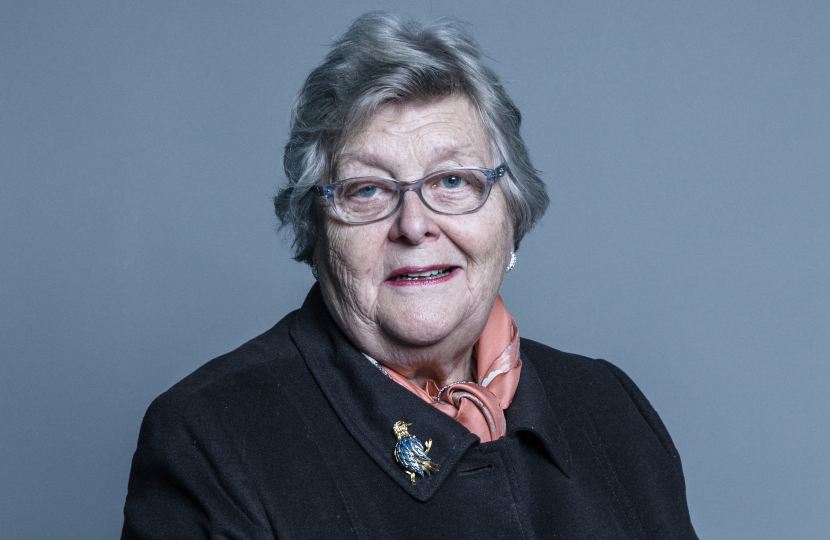
On 2 February 2023, Baroness Lynda Chalker of Wallasey made her final speech in the House of Lords, prior to her retirement on 3 February.
Baroness Chalker joined the House of Lords in 1992, shortly after losing the Parliamentary seat of Wallasey, which she had held since 1974.
She jointly holds the 20th-century record for continuous government service, along with Kenneth Clarke, Malcolm Rifkind, Tony Newton and Patrick Mayhew, as she held office for the entire duration of the Conservatives' 18 years in power.
My Lords, it is a very strange feeling to be making this speech in this House after so many happy years. Some will recall that I made my maiden speech in the Palace of Westminster in early 1974; 18 years later, my maiden speech in this House was on the Maastricht Bill. I hope I shall not disappoint the noble Earl, Lord Kinnoull, who spoke so kindly in anticipation of this speech, but I think he can deal with all the detail. I should just say my grateful thanks.
There is a very large list of thanks to the many people who have helped me in my formal political years. There are private secretaries and their deputies in four government departments—as we then worked in—our advisers and Permanent Secretaries. I add my sincere thanks to colleagues in this House, friends in all parties, all the staff in the clerk’s department, the Library, Hansard, the refreshment department and the staff who keep us warm and safe, but especially to the doorkeepers of this House. Above all, I must thank the Foreign, Commonwealth and Development Office teams who guided me from 1986 to 1997. They were always faithful, helpful and thoughtful.
My thanks go too to my family and friends, my drivers and personal secretaries. Each has played a significant part in my ability to deliver my role. They often altered their plans to accommodate my timetable, missed many meals and had family time shortened or cancelled with little complaint.
The close of my days as an active Peer really began about two years ago during the second Covid lockdown. I found it a very stressful personal time. Once a person no longer feels able to research and produce good work on time, it is time to decide how to plan ahead and possibly not to continue in a previously much-loved role, but to move on to other tasks and a less strenuous working style.
So I am retiring before my colleagues feel that I am past the role that I have so valued since 1992: that of an active life Peer. By this action, I may allow a space in this House for younger, able future Peers. Perhaps there could be more spaces created, for there are many able persons outside who could play valuable roles in this House, but we are a very full complement at present.
With more time to utilise my enjoyments, I shall take up new voluntary tasks, not only in the UK but also in South Africa. I will begin by voluntarily teaching eight year-old township children to read and speak English. I am starting to paint and draw again, and I am now able to be more involved in animal and Fijnbosch conservation in the Gondwana game reserve in the southern Cape. I will protect my family time in all countries to the hilt.
The many trials and travails of political life are evident in the public discomfort of too many Members in both Houses. My first political hero was the late Iain Macleod, followed by a number of noble Lords in this House. Iain encouraged me to listen well, even to those with whom I disagreed. In EU politics, this has been more than a tall order, for the instances of facts being twisted by some politicians and the press are too numerous to list. However, as my colleagues on the various EU Select Committees have identified, we need to remain fully involved with the EU to get the best that remains after our losses from our exit from the union. I have already asked Ministers to take greater action to improve the passage of goods and people at border crossings, for instance. This Select Committee’s work is critically important to ensure that all aspects of the changes are fully understood and well implemented.
Whatever the future of this House, coming generations face a major challenge in contributing as much to reform in British society as has been achieved by those in the Lords today, in their wide range of careers; I have learned so much from them. Politics of any shade need doers who contribute sound examples of improvement, especially for local societies and national charitable work and particularly in the health and social care field, as in all aspects of our public life. My sincere wish is that we can stimulate much more involvement in local communities, which will improve our society. Without that, we are not a really active nation in the way we should be.
I wish all colleagues and staff good health, sound debate and sufficient time away from debates to regain a happy balance between work in your Lordships’ House and recreation time, especially in their later years. I thank all noble Lords for these fascinating years and a really enjoyable career, although sometimes it was a bit tiring.



